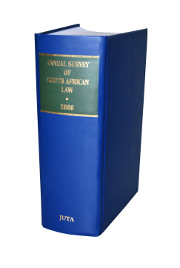Constitutional Property Law

Constitutional Property Law
Authors AJ van der Walt
ISBN: 978 1 48513 300 1
Affiliations: Distinguished Professor, Faculty of Law, Stellenbosch University and South African Research Chair in Property Law
Source: Annual Survey of South African Law, 2014, p. 195 – 215
Abstract
None